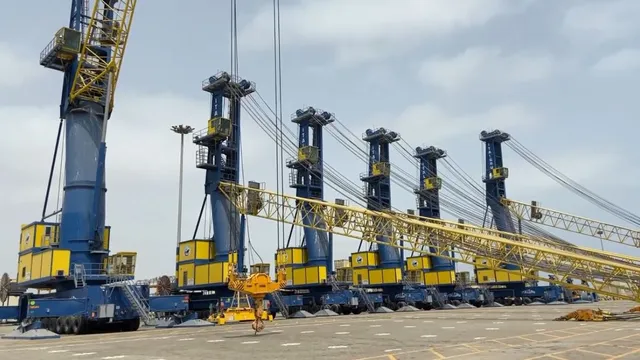- By Supratik Das
- Fri, 27 Jun 2025 02:16 PM (IST)
- Source:JND
As the 12-day Israel-Iran war rattled the Middle East and pushed Central Asia to the edge, India’s Chabahar Port project in Iran stood out from any impact due to New Delhi’s deft diplomacy and long-term vision for regional connectivity. As some sections of Tel Aviv were subjected to massive strikes and US-Israeli bunker-busting raids on Iran's nuclear facilities, the Chabahar Port, the center point of India's regional strategy, functioned without any sort of interruption, highlighting how New Delhi succeeded in what Pakistan had failed to do with Gwadar.
Gwadar vs Chabahar: India's Strategic Gateway To Central Asia
Chabahar Port, in southeast Iran, is India's gateway to bypassing Pakistan for trade with Afghanistan and Central Asia. The port, a mere 550 nautical miles from Gujarat's Kandla port, has direct access to the Indian Ocean, avoiding the chokepoint of the Strait of Hormuz. India's investments in Chabahar are over 550 million USD, including Shahid Beheshti terminal operation, financing of rail connections such as the Chabahar-Zahedan railway, and a credit line of 250 million USD for infrastructural development.
Only 170 km from Chabahar, Pakistan's Chinese-funded Gwadar Port suffered indirect consequences. During the Israel-Iran war, Pakistan closed border crossings with Iran at Balochistan's Gwadar district, suspending informal oil trade and causing food shortages in the adjacent regions, as reported by local media. Gwadar, one of the China-Pakistan Economic Corridor (CPEC) crown jewels, was unable to beat Chabahar's resilience, as it kept running even while air freight prices spiked 15 per cent and ocean freight increased by 1,000 USD per container amid the war crisis.
Indian government's firm stand played a crucial role amid the rising tensions in the Middle East. On June 13, Prime Minister Narendra Modi spoke to Israel's Benjamin Netanyahu and Iran's President Masoud Pezeshkian, appealing to both sides to de-escalate. External Affairs Minister S. Jaishankar echoed this appeal in bilateral talks with Iran's Foreign Minister Abbas Araghchi. India's diplomatically balanced outreach pacified both Tehran and Tel Aviv. Remarkably, Iran’s missiles stayed clear of Central Haifa Port in Israel, too, where Indian cargo operations continued despite attacks near an oil refinery.
Long-Term Agreements Secure India's Role
On 13 May 2024, India and Iran inked a 10-year deal providing India operational control of the Shahid Beheshti terminal in Chabahar. This replaces a string of one-year agreements, ensuring India's presence for 10 years and sending a strong message despite US sanctions. Chabahar is also being linked with the International North-South Transport Corridor (INSTC), enhancing trade connectivity between India, Iran, Russia, and Central Asia. Uzbekistan, five Central Asian nations, and even Afghanistan's Taliban regime have supported Chabahar's position in regional trade.
While US sanctions on Iran pose challenges, the Chabahar Port project has had periodic exemptions due to its significance to Afghanistan's humanitarian requirements and Central Asia's connectivity. When the US threatened sanctions in April 2024, Jaishankar highlighted Chabahar's benefits in the region, cautioning Washington against a "narrow view". The port has already served more than 8.4 million metric tonnes of cargo and played an important role during the COVID-19 period by facilitating the shipment of food aid to Afghanistan.
India's consistent efforts at sustainable, transparent infrastructure are finally paying off. By insulating Chabahar from the fallout of a massive conflict, New Delhi demonstrated that subtle diplomacy and wise investments can deliver economic lifelines even during troubled times. As global supply chains come under fresh threats and energy security remains uncertain, Chabahar Port remains crucial to India's increasing influence in Central Asia and a reminder that long-run diplomacy can frequently work when an aggressive posture does not.

